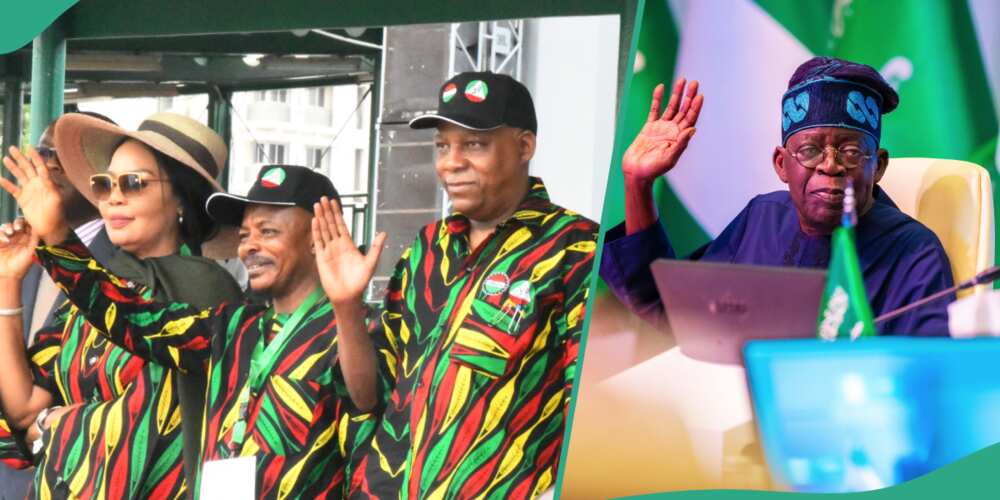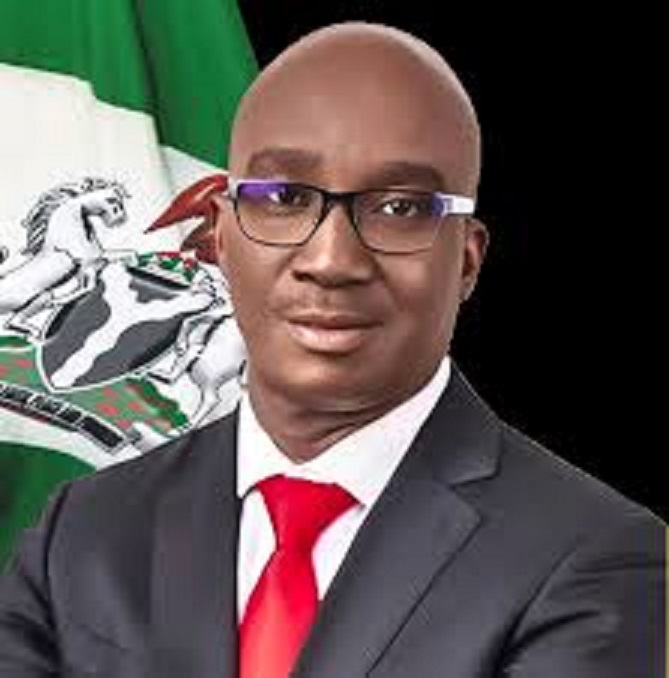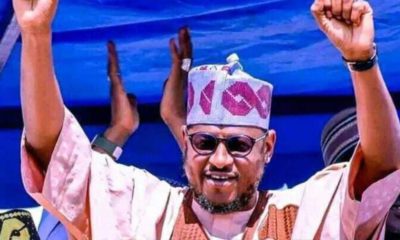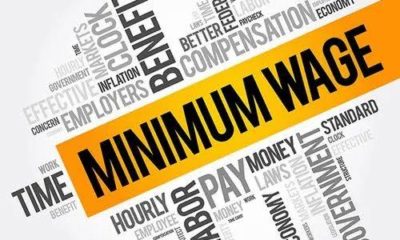NEWS
Minimum Wage: Labour Decries FEC’s Delay Tactics, Urges Consultation

The Organised Labour has decried the Federal Executive Council’s (FEC) delay tactics on the memorandum on the report of the Tripartite Committee on New National Minimum Wage.
It was gathered the FEC had on Tuesday stepped-down action on the memo.
In a swift reaction, the Head, Public Relations at the Nigeria Labour Congress (NLC), Benson Upah, raised a strong voice against the failure of FEC to consider the memo at Tuesday’s meeting.
Upah insisted that the stepping down the tripartite committee report “creates room for injurious speculations.”
On his part, the Minister of Information and National Orientation, Mohammed Idris, told media men after the FEC meeting that they stepped down the memorandum on the new minimum wage to allow for more consultations between President Bola Tinubu, state governors, local government authorities and the private sector.
According to Idris, the FEC deferred acting on the memo on the ground that the Federal Government is not the sole stakeholder on the national minimum wage issue.
Recall that the Federal Government, the Organised Private Sector (OPS) and Organised Labour had held several meetings on the new minimum wage with the NLC and Trade Union Congress (TUC) leaders insisting on N250,000.
The Federal Government, states and the OPS, had, however, made a counter-offer of N62,000.
The interesting twist in the matter appears to be the state governors, under the banner of the Nigerian Governors Forum (NGF) having declared that any minimum wage higher than N60,000 was not sustainable.
While that was going on, some voices of reason including reputable economists threw a figure of N100,000 into the conversation.
However, the Assistant General Secretary of the NLC, Chris Onyeka, had made it clear that Labour would accept neither the Federal Government’s offer of N62,000 nor the N100,000 thrown up by independent voices.
Labour’s position was reinforced by the words of its President, Joe Ajaero, that the unionists were waiting on the President to consider Labour’s proposal.
It does appear that the Federal Government was aiming to politicize the issue of minimum wage by taking the campaign to even religious bodies.
The Minister for Information, had told the 2024 Synod of the Charismatic Bishops Conference of Nigeria in Abuja, that the government was focused on a realistic wage system with a view to safeguarding employment and guarding against mass retrenchment.
According to Idris, the N250,000 minimum wage proposal could undermine the economy, lead to mass retrenchment of workers and jeopardise the welfare of Nigerians.
The concerns in certain quarters note that in his Democracy Day broadcast, President Tinubu assured that he would forward a bill on the new minimum wage to the National Assembly soon.
He told governors and members of the National Assembly on the occasion of the nation’s 25th Democracy Day anniversary at the State House that his administration would pay whatever it could afford as the new minimum wage.
President Tinubu’s stand had drawn the ire of Labour, which insisted that the political office-holders should also be paid the minimum wage.
The Senate spokesman, Yemi Adaramodu, said, “The President will likely send the minimum wage bill after the Sallah break.”
Recall that the Senate had adjourned plenary for the Sallah break and is due to resume on July 2.
But the then acting President of the NLC, Prince Adewale Adeyanju, said Labour would not accept the N62,000 proposed by the government and OPS, advising the President to pay workers a living wage and ignore those he described as sycophants.
He also refuted insinuations that a consensus had been reached between the Federal Government and Labour on the new wage.
On Monday, the NLC President, Ajaero, mentioned that Organised Labour expected Tinubu to reach out to the members of the tripartite committee to harmonise the figure, given the stalemate at the end of the committee meeting.
Addressing State House correspondents after Tuesday’s FEC meeting, the information minister, Idris, explained that the President needed to interact with other wage-paying entities to factor their contributions and circumstances into the executive bill on minimum wage that would be passed on to the National Assembly for passage into law.
He stated, “I want to inform Nigerians here that the Federal Executive Council deliberated on that (minimum wage) and the decision is that because the new national minimum wage is not just that of the Federal Government, it is an issue that involves the Federal Government, the state governments, local governments, and the organised private sector and of course, including the organised labour.
“That memo was stepped down to enable Mr President to consult further, especially with the state governors and the organised private sector, before he makes a presentation to the National Assembly before an executive bill is presented to the National Assembly.
“So I want to state that on the new national minimum wage, Mr President is going to consult further so that he can have an informed position because the new national minimum wage, as I said, is not just an issue of the Federal Government.”
He said the President studied the report and will “consult wider before a final submission is made to the National Assembly.”
Reacting to the FEC’s decision, the NLC spokesman, Upah, declared that stepping down the minimum wage memo did not bode well for workers.
When asked if the decision to postpone the consideration of the minimum wage memo was a waste of time, he responded, “Definitely, stepping down the minimum wage memo does not bode well with or for us. It creates room for injurious speculations.”
The Deputy National President of the TUC, Tommy Etim, said he expected the President to address the ‘grey areas’ ahead of the transmission of the executive bill on the new minimum wage to the National Assembly.
“I want to believe that the government is very conscious of the grey areas which organised labour has pointed at, especially the amount to be accepted by every party involved, the frequency of review and criteria for the review and application.
“These, amongst others, are the burning issues which to the best of my knowledge need to be addressed before its consideration by FEC to the National Assembly,’’ he noted.
NEWS
Okpebholo Moves To Clear 12-Year Backlog Of Arrears To Edo Pensioners

As part of efforts to address the long-standing plight of retired civil servants, Edo State Governor, Senator Monday Okpebholo has approved the payment of outstanding gratuities dating back to 2012.
According to a government house statement on Monday, the state government has, therefore, commenced the disbursement of N1 billion as the first batch of payments, fulfilling a commitment to clear the backlog inherited from previous administrations.
Gov Okpebholo emphasized his administration’s resolve to prioritize the welfare of retired civil servants who have dedicated their years of service to the state.
He noted that “For over a decade, many of our retirees have suffered due to the non-payment of their gratuities. This administration is putting an end to that hardship. I have approved the release of N1 billion for the first phase of payments, and we will not rest until all outstanding entitlements are cleared.”
ALSO READ: Okpebholo Welcomes Ikpea To APC, Expects More Defectors
The Governor reiterated that his administration is committed to restoring the dignity of pensioners by ensuring that they receive their due benefits without further delay.
“We recognize the sacrifices made by our retirees, and it is unacceptable that they have had to wait this long for what is rightfully theirs. Our administration will not only clear these arrears but will also put measures in place to ensure such delays do not happen in the future,” Gov Okpebholo added.
He reaffirmed that his administration’s goal is to clear all outstanding gratuities in phases, ensuring that retirees enjoy the fruits of their labour.
The Governor further assured that the disbursement process will be transparent and fair, with pensioners receiving payments in batches based on a structured verification process.
“This is just the beginning. We will not abandon our pensioners. We are determined to ensure that those who served Edo State diligently are treated with the respect and care they deserve,” he concluded.
NEWS
Protest, But Don’t Destroy – FG Tells Youths
The Federal Government has reaffirmed its support for the rights of Nigerian citizens, especially young people, to stage protests and express their dissatisfaction with pressing national issues.
However, it cautioned that such actions must remain peaceful and must not result in the destruction of public infrastructure.
Minister of Youth Development, Comrade Ayodele Olawande, made this known in Abuja on Monday in response to recent youth-led protests across parts of the country.
READ MORE: EFCC Issues Arrest Warrant For Socialite Aisha Achimugu
“Everyone has the right to protest. In fact, if I had the time, I would join the protest myself. There is freedom of expression for all. The young people who are protesting have valid reasons, they see certain issues and feel the need to speak up,” Olawande said.
While backing the right to demonstrate, the minister emphasized the importance of maintaining peace and order during such actions.
He warned that any attempt to damage national infrastructure under the guise of protest would not be tolerated.
“However, while exercising this right, let it not escalate into something else. We will not allow anyone to destroy the infrastructural developments that support our economy and the progress we’ve made in this country,” he stated.
He further urged protesters to express their concerns in ways that do not obstruct public movement or endanger lives, suggesting that peaceful advocacy is more effective and likely to attract genuine attention from authorities.
“Yes, you have the right to speak, to come out and make your voice heard even to stand by the roadside but do not block the roads. Find a peaceful way to express your concerns; people will listen. If I have the opportunity, I’ll be there to speak with them as well.”
Olawande assured that the government is not opposed to demonstrations, but stressed that such activities must be carried out with a sense of responsibility and respect for public property.
“Protesting is a normal part of any society, and we are here to listen. No government is saying you shouldn’t protest but there must be limits and a sense of responsibility,” he added.
NEWS
Okpebholo Welcomes Ikpea To APC, Expects More Defectors

Edo State Governor, Senator Monday Okpebholo, is of the view that a wave of massive defections will soon hit opposition political parties in the South-South zone ahead of Nigeria’s 2027 elections.
He bared his mind over the weekend at a special reception in his honour at Ewatto, Esan South East local government area of Edo State after his victory at the election petition tribunal ruling.
He expressed gratitude to Edo people for their support, prayers, and counting him worthy to lead the State and assured the people that Edo would progress and develop under his watch.
In his words, “The people of Edo State will not regret voting me as their Governor. I am happy today that l am in a winning party. A party that was rejected by all and now has become the party that everybody wants to join. APC has come to stay as the government at the center is APC.
ALSO READ: TURJI BELLO: HURIWA Urges Security Chief To Resign Honourably
“Very soon, there will be a lot of defections into the APC. People will move and cross carpet from PDP, LP and other opposition parties into the APC and that will be the beginning of South South keying into the reform agenda of President Bola Ahmed Tinubu.
“Today, I am happy and proud to say that I am a son to the President of the Federal Republic of Nigeria. I am also proud to say I carry uncommon grace and uncommon transformation which I am already using to transform and develop Edo State.
“Words that come out of my mouth are prophetic and i am using these words to develop Edo State. My administration is working to ensure motorable roads and reducing traveling time for our people.
“Our development is also covering other neighboring States because South South must speak with one voice as we approach 2027.”
He had kind words for the royal fathers.
“I want to use this opportunity to appreciate our royal fathers for their support and prayers. I also appreciate Edo people for finding me worthy to cast their votes for me on September 21st governorship election in Edo State.
“It is not easy to run two elections in a year and win the two offices. I give God the glory. I am not the talking type and never interested in politics, but really want to develop Edo State.
“In 2021, we looked for an Esan man that would contest for Senate and we did not find any one who wanted to contest under the All Progressives Congress (APC) as everyone wanted to contest under the Peoples Democratic Party (PDP).
“The drive to contest came in 2022 when some people came to appeal to me to contest for the Senate and our discussion became an eye opener which led me into contesting for the Senate seat.
“I lost a beloved sister due to bad water which she consumed and I vowed to ensure good water is available across the State.
“I am really going to ensure good water runs in Edo State. Our development will not just be roads, schools, healthcare, providing the people with good drinking water across the State.”
The Governor and his entourage visited the place of the Onojie of Ewatto, HRH Osagie Sylvanus Ikhumen I, who was joined by other traditional rulers from Edo Central who received the Governor and prayed for the success of his administration.
He also inspected Chief Lee Ikpea’s Medical Center, Idumuiyase, Ewatto, where he was taken round the facility of the hospital, which is yet to be completed by the donor, Dr. Lemon Ikpea.


















